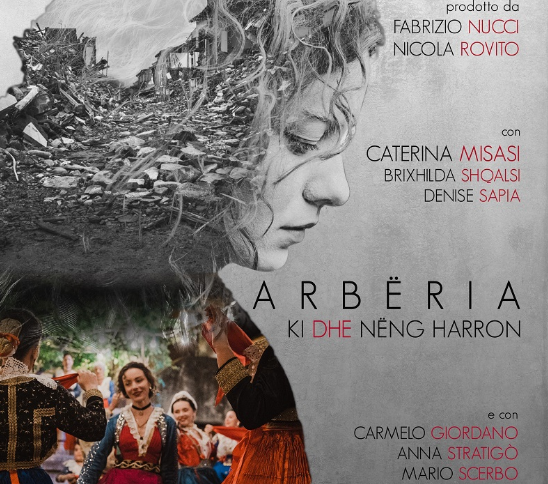[ad_1]
Since December 23, 2021, on the largest movie platform in the world, Netflix, has started the broadcast of the first movie in Albanian, “Arbëria”.
“Arberia” is a film, which tells the story of a girl named Aida, who after the death of her father, returns to her country of origin in Calabria, where she discovers the culture and traditions of Arberia.
The fact that this film is currently the first in Albanian on Netflix, has given even more echo to this film, through which the world is already knowing the culture and history of the Arbëresh of Italy. The director gave an interview to the Kosovar newspaper “Telegraf”.
Telegraph: You are the director of the movie “Arbëria” that has now been shown on Netflix and is dedicated to the Arbëresh Albanians of Italy. Tell us a little more about the whole movie?
Francesca Olivieri: “Arberia” is a story of nostalgia, but also a story of conflict between past and present, origin and aspirations. Aida is a bold and modern woman, but also melancholy and with a combative personality that lives between the need to adapt and the search for identity. She is a stylist, having moved many times has settled in a city where she has opened an elegant clothing tailor. But with the death of her father, Aida is forced to return to her native village, located in the mountains, in southern Italy. During this journey, Aida will rediscover her mother tongue: the Arbëresh, an ancient Albanian language spoken in the minority community: the descendants of predominantly Albanian Tosk refugees who fled Albania between the fourteenth and eighteenth centuries as a result of the Ottoman occupation. in the Balkans. This “land of the soul” – called Arberia – gives Aida a new energy, through which she will regain control of her life and she will reconcile with her past.
Telegrafi: How did the idea for the realization of a film with the theme of the Albanians of Italy come about. Where did you get your inspiration?
Francesca Olivieri: Aida’s story is partly inspired by the personal experiences of my aunt and grandmother, born in Santa Caterina Albanese, Calabria, southern Italy. I wanted to immerse myself in these biographical elements and orient myself towards the power and grace of real invention. The theme is definitely personal, I myself am a young woman who has emigrated and I hope this story of human generosity is of interest to a culturally dispersed public. I remember the first time I saw a dance, the traditional Arbëresh dance, I was shocked because I felt how magical this moment was and it has a cinematic potential in itself. Then the fact of hearing my grandmother speak many times in this language was definitely my main source of inspiration. She has been my special muse throughout the film and taught me the traditions and what counts in Arbëresh culture.
Telegraph: What were the most difficult moments you experienced during the making of this film?
Francesca Olivieri: There were many difficulties on the eve: before (during preparation) and after (during postproduction). Filming time is exciting, but there are always unexpected moments, it takes some of the stress out of this job.
Telegraph: What about the most enjoyable moments in the background?
Francesca Olivieri: I remember one time, when Anna Stratigi said a line that was not in my script, and we all started laughing and then this joke became the catchy phrase of all the team members, it was funny!
Telegraph: How was the film “Arbëria” received at film festivals?
Francesca Olivieri: The film premiered in 2019, and then premiered in Cosenza for the premiere and tickets sold out: it was a successful evening. It was then published in many festivals in Europe: the first time was in Tirana at the Dea Festival and received the Public Jury Prize. We then screened the film in France, Wales, Norway, Germany for various Italian film festivals. There has always been a large public interested in this story, because many people do not know about the history of Albania and its ancestors. In Italy during all the performances there was a pleasant surprise, because the Italians know the Albanian people and the recent history of this country, but ignore that their descendants came to Italy during the fifteenth century.
Telegraph: Have you ever watched an Albanian film, if so which one?
Francesca Olivieri: I was invited with the film at Giornate del cinema Albanese, at Casa del Cinema in Rome, in 2019. When I was there I watched a lot of Albanian films. I was then invited as a member of the jury for the Dea Film Festival, last year. We were away because of the pandemic situation, we watched a lot of short films and I remember I was impressed by the student film, they were all interesting to me and it was really hard to make a choice as a member of the jury!
Telegraph: Francesca, thank you very much for being part of this interview. Finally, what would be your message to our readers?
Francesca Olivieri: My grandmother has often said that her village belongs to a nation that does not exist: Arberia. This population is in fact stateless, but addresses its community in difficult times, as happened at the time of the intervention for the war refugees in Kosovo, to which they responded with this formula: “We are brothers, our blood has been shed ”. Bloodshed, dual culture, a rejected or hidden ethnicity, these are the topics that inspired me to write this piece. I hope the film is appreciated, also for this message.
top channel
[ad_2]
Source link















